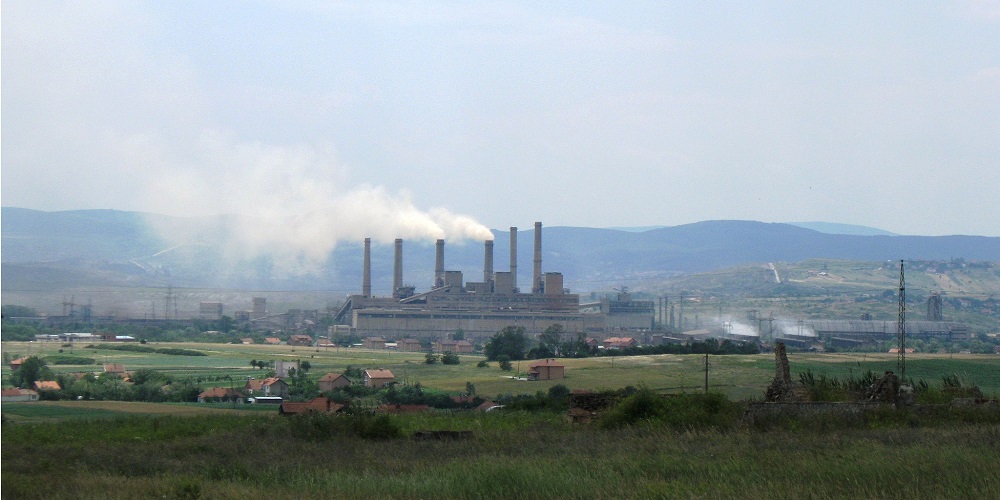“If you find yourself in a hole, stop digging” is an adage that decision-makers in the Western Balkans would do well to heed. This particularly applies to plans to bring online new coal power plants and the legal, economic and credibility risks these entail.
Ioana Ciuta, Energy coordinator | 20 January 2020

Kosovo A Power Station
Just last week the Energy Community Secretariat announced it had pushed forward the second phase of a three-step process determining Bosnia and Herzegovina’s alleged breach of state aid rules in granting a guarantee for a loan to build the Tuzla 7* lignite plant. Given that the total sum of the guarantee is not even specified in the Federal Government’s documents, this guarantee could cost Bosnia and Herzegovina dearly.
How did the Tuzla 7 hole get so deep?
In September 2018, the Sarajevo-based NGO Aarhus Resource Centre and Bankwatch submitted a complaint to the Energy Community signalling that the Federation’s plan to guarantee the EUR 614 million loan from China ExIm Bank did not comply with EU rules and should be investigated. The guarantee covers 100 per cent of the loan plus interest and other associated costs. Usually, only up to 80 per cent may be covered by a guarantee, and while there are circumstances in which a higher guarantee is allowed, these are not fulfilled in this case.
The Energy Community Secretariat commissioned an expert analysis to look into the complaint in early March 2019, confirmed our claims: the proposed loan guarantee has elements of State aid. The Secretariat called on the State aid Council of the Federation of Bosnia and Herzegovina to re-examine the case and the Federal Parliament not to adopt the guarantee. The Parliament however was blind and deaf to the warnings and went ahead with the vote in favour a few days later. In response to this defiance, the Energy Community Secretariat opened an infringement case three weeks later.
For a while, it looked like the Bosnian authorities had finally accepted the seriousness of the situation and agreed to bring this matter to mediation. However, in a textbook example of nose-thumbing, the Federal Minister of Finance signed the guarantee agreement without prior clarification of compliance with Energy Community State aid rules on 19 November 2019, leaving the mediation process void.
The reasoned opinion sent by the Secretariat on 16 January 2020 to Bosnia and Herzegovina is a reminder that compliance with the Treaty is not optional and that there are consequences for those who think otherwise.
Kosovo also learning the hard way
In December 2019, the Energy Community Secretariat also opened an infringement case against the Government of Kosovo, citing concerns over the illegality and existence of State aid in relation to the Kosova e Re lignite power plant project**.
Several Kosovar NGOs*** supported by Bankwatch submitted a complaint in May 2019, which alleges that the 20-year power purchase agreement, signed by the Kosovar government with ContourGlobal in December 2017 for the construction of the 500 MW unit of Kosova e Re fails to comply with the Energy Community Treaty rules on State aid because it provides ContourGlobal a range of benefits that give it an unfair advantage over other energy producers. If the Government fails to bring itself into compliance, the Secretariat will pursue the case further.
These cases are important because they are not just about breaking the rules. They exemplify how the Bosnia-Herzegovina and Kosovo governments are blindly pursuing new coal projects without understanding that coal is no longer a cheap option, but will actually cost them dearly. Unfortunately, the same is happening in Serbia, where the government has even taken a loan on behalf of the energy company developing the Kostolac B3 project.
The Kosovo power purchase agreement, in particular, is a rip-off that Kosovo cannot afford. Even the World Bank, which for years backed the preparation of the project, in the end found that it was not the cheapest option. Tuzla 7 too, presents untold risks for Bosnia and Herzegovina due to the over-optimistic assumptions about coal and carbon prices in its feasibility study, which are likely to result in nasty surprises later.
Both Bosnia and Herzegovina and Kosovo are struggling financially, and cannot afford to ignore warnings from projects like Sostanj 6 in Slovenia and Ptolemaida V in Greece. Both these projects went ahead in spite of warnings from civil society and economics experts, and both are now a liability. Sostanj 6 is loss-making, while the future of Ptolemaida V is uncertain, even while it is under construction. The Energy Community Secretariat’s infringement cases really should be the last 12th hour warning.
* The 450 MW Tuzla 7 project would result in additional coal capacity compared to the current situation. The project would be implemented by the China Gezhouba Group Co. and be financed by a loan from China Exim Bank
** Kosova e Re is planned to have a gross capacity of 500 MW and in December 2017, the Kosovo government signed a series of commercial contracts with UK-registered ContourGlobal for a 20-year concession to build and operate the plant. All electricity would be bought off by the State at a “target price” of EUR 80/MWh, much higher than current electricity prices, leaving ContourGlobal with almost no commercial risks.
*** Balkan Green Foundation, GAP Institute, Group for Legal and Political Studies, INDEP
Never miss an update
We expose the risks of international public finance and bring critical updates from the ground – straight to your inbox.
